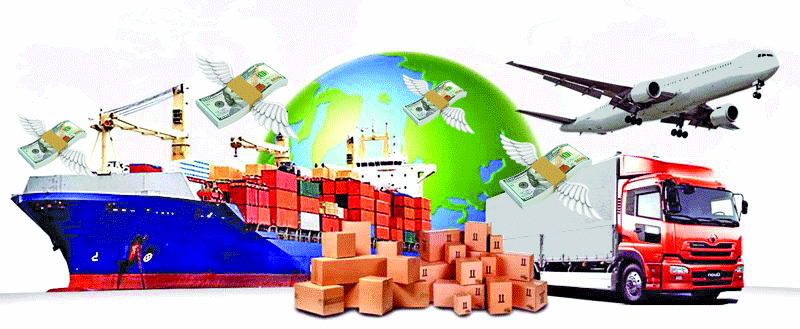Tk 60,000 cr laundered under guise of exports
IMF suspects
Staff Correspondent: The International Monetary Fund-IMF sees the big difference in the income coming to the country through the export of goods in the last financial year as a signal of capital laundering. Part of this difference may be due to methodological reasons, the agency believes. But the highest unexpected export earnings in history may have links to money laundering.
There is such a view in a separate presentation called ‘Selected Issues’ in the Bangladesh Country Report published by the IMF last Friday. It has been said that the uncertainty surrounding the national elections may be one of the reasons why large amounts of export earnings do not come into the country. A section of exporters is believed to be reluctant to bring their proceeds into the country until the election results are known. Earlier, the updated report of the World Bank on the economy of Bangladesh published last October said that the large difference between the shipment of export goods and the repatriation of export earnings is one of the reasons for the large deficit in the foreign trade balance. Because of the more than $8 billion shortfall in the overall trade balance last fiscal year, more than $3 billion was due to reporting errors and omissions. Various studies have shown that it is associated with illegal capital laundering through false declarations in trade.
Bangladesh Bank and exporters’ organizations have said at various times that there will be procedural differences between shipment of goods and repatriation of export proceeds at a given time. Because, the Export Development Bureau (EPB) publishes the statistics based on the bill of export issued by the custom house after the evaluation of the goods. Even after the bill of export, many times the export may be delayed or canceled due to isolated reasons. On the other hand, Bangladesh Bank prepares export statistics after reporting the information on the shipment of goods or bill of lading in the Online Export Monitoring System (OEMS), which is included in the balance of payments or balance of transactions information. And after the deposit of foreign currency as a commercial bank, it discloses the information of bringing export income to the country.
Why doubt?
According to Bangladesh Bank, in the last financial year 2022-23, the amount of foreign currency deposited in commercial banks for the export of goods is $43.57 billion, which is less than the previous financial year. In the fiscal year 2011-22, the amount of which is $4,360 million. However, according to both EPB and Bangladesh Bank, exports have increased by more than 6 percent compared to the previous fiscal year. According to EPB, products worth $5,566 million were exported in the last financial year. According to Bangladesh Bank, the amount is $5,233 million. However, the export income that has entered the country is $12 billion less than EPB’s statistics and about $9 billion less than Bangladesh Bank. In local currency, which amounts to Tk 1 lakh to Tk 1 lakh 30 thousand crores.
Non-payments due to export cancellations, failure to pay when importing firms go bankrupt, and misreporting of goods from EPZs to local markets in export figures can lead to discrepancies between export prices and remittances, the IMF said. But such a big difference between the two indicates money laundering.
Professor Mostafizur Rahman, Honorary Fellow of Research Institute CPD, also thinks that there is no logical reason for such a big difference. A large part of this refers to money laundering. According to him, it is true that the shipping and export repatriation data in a particular financial year will not be the same. But supposed to be close. This is because, if the goods are shipped before the beginning of a financial year, export income may come into the country in the next financial year, while if the goods are shipped at the end of the financial year, it may be added as income in the next financial year. As a result, it is unusual for there to be a very large difference between the two in a fiscal year.
He said, past experience has shown that money laundering increases before and after elections. This time, the foreign exchange crisis is connected with the election. As the taka depreciates against foreign currencies, exporters tend to repatriate earnings late.
It may be mentioned that Global Financial Integrity (GFI), a research and consulting firm based in Washington, studies the flow of illicit money related to the trade of developing countries. According to their latest published report, an estimated Tk 50,000 to Tk 60,000 crore is smuggled out of Bangladesh under the guise of trade.
BGMEA President’s speech
Farooq Hasan, president of Readymade Garments Exporters’ Association BGMEA, felt that the gap between export value and repatriated money was created due to a gap in Export Processing Zone (EPZ) data. EPZ export information is displayed in two places. First time when direct export from EPZ factory, second time when selling raw material to another exporter factory is also shown as export. He will talk to the relevant authorities to avoid this duality.
Referring to the IMF report, Farooq Hasan said, like many others, the IMF is saying that less money is coming into the country from exports. No one is giving real information and statements about how much less, why less. Even after signing the contract with the buyer, there are many old cases of underpaying or delaying the export price due to various reasons. So non-repatriation of export value does not mean smuggling.
Rare Israeli airstrike in Beirut kills Hezbollah commander and more than a dozen others
International Desk: Israel launched a rare airstrike that killed a senior Hezbollah milita…








